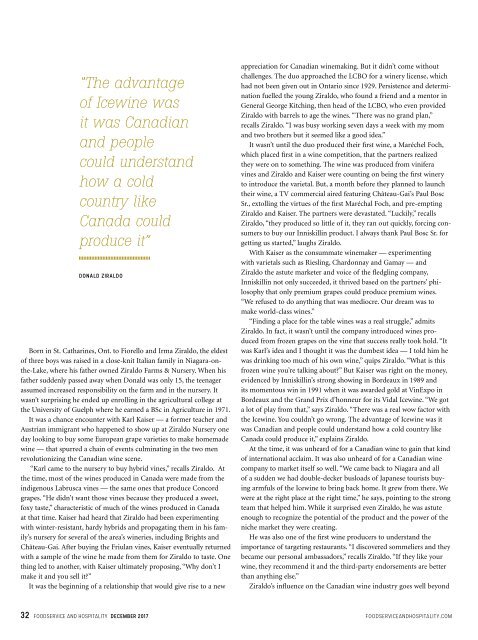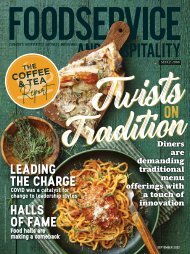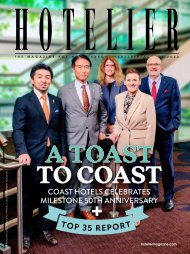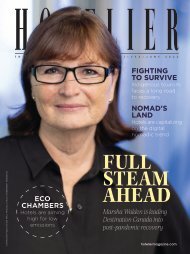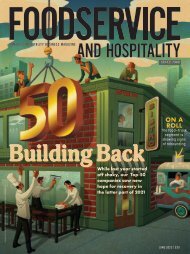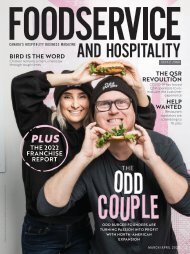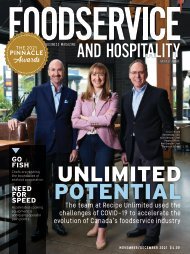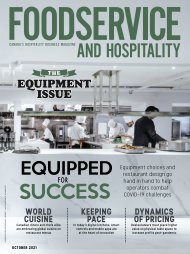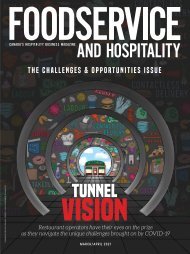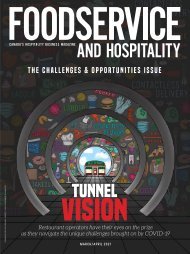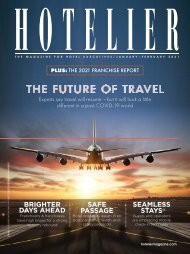December 2017 Digital Issue
Create successful ePaper yourself
Turn your PDF publications into a flip-book with our unique Google optimized e-Paper software.
“The advantage<br />
of Icewine was<br />
it was Canadian<br />
and people<br />
could understand<br />
how a cold<br />
country like<br />
Canada could<br />
produce it”<br />
DONALD ZIRALDO<br />
Born in St. Catharines, Ont. to Fiorello and Irma Ziraldo, the eldest<br />
of three boys was raised in a close-knit Italian family in Niagara-onthe-Lake,<br />
where his father owned Ziraldo Farms & Nursery. When his<br />
father suddenly passed away when Donald was only 15, the teenager<br />
assumed increased responsibility on the farm and in the nursery. It<br />
wasn’t surprising he ended up enrolling in the agricultural college at<br />
the University of Guelph where he earned a BSc in Agriculture in 1971.<br />
It was a chance encounter with Karl Kaiser — a former teacher and<br />
Austrian immigrant who happened to show up at Ziraldo Nursery one<br />
day looking to buy some European grape varieties to make homemade<br />
wine — that spurred a chain of events culminating in the two men<br />
revolutionizing the Canadian wine scene.<br />
“Karl came to the nursery to buy hybrid vines,” recalls Ziraldo. At<br />
the time, most of the wines produced in Canada were made from the<br />
indigenous Labrusca vines — the same ones that produce Concord<br />
grapes. “He didn’t want those vines because they produced a sweet,<br />
foxy taste,” characteristic of much of the wines produced in Canada<br />
at that time. Kaiser had heard that Ziraldo had been experimenting<br />
with winter-resistant, hardy hybrids and propagating them in his family’s<br />
nursery for several of the area’s wineries, including Brights and<br />
Château-Gai. After buying the Friulan vines, Kaiser eventually returned<br />
with a sample of the wine he made from them for Ziraldo to taste. One<br />
thing led to another, with Kaiser ultimately proposing, “Why don’t I<br />
make it and you sell it?”<br />
It was the beginning of a relationship that would give rise to a new<br />
appreciation for Canadian winemaking. But it didn’t come without<br />
challenges. The duo approached the LCBO for a winery license, which<br />
had not been given out in Ontario since 1929. Persistence and determination<br />
fuelled the young Ziraldo, who found a friend and a mentor in<br />
General George Kitching, then head of the LCBO, who even provided<br />
Ziraldo with barrels to age the wines. “There was no grand plan,”<br />
recalls Ziraldo. “I was busy working seven days a week with my mom<br />
and two brothers but it seemed like a good idea.”<br />
It wasn’t until the duo produced their first wine, a Maréchel Foch,<br />
which placed first in a wine competition, that the partners realized<br />
they were on to something. The wine was produced from vinifera<br />
vines and Ziraldo and Kaiser were counting on being the first winery<br />
to introduce the varietal. But, a month before they planned to launch<br />
their wine, a TV commercial aired featuring Château-Gai’s Paul Bosc<br />
Sr., extolling the virtues of the first Maréchal Foch, and pre-empting<br />
Ziraldo and Kaiser. The partners were devastated. “Luckily,” recalls<br />
Ziraldo, “they produced so little of it, they ran out quickly, forcing consumers<br />
to buy our Inniskillin product. I always thank Paul Bosc Sr. for<br />
getting us started,” laughs Ziraldo.<br />
With Kaiser as the consummate winemaker — experimenting<br />
with varietals such as Riesling, Chardonnay and Gamay — and<br />
Ziraldo the astute marketer and voice of the fledgling company,<br />
Inniskillin not only succeeded, it thrived based on the partners’ philosophy<br />
that only premium grapes could produce premium wines.<br />
“We refused to do anything that was mediocre. Our dream was to<br />
make world-class wines.”<br />
“Finding a place for the table wines was a real struggle,” admits<br />
Ziraldo. In fact, it wasn’t until the company introduced wines produced<br />
from frozen grapes on the vine that success really took hold. “It<br />
was Karl’s idea and I thought it was the dumbest idea — I told him he<br />
was drinking too much of his own wine,” quips Ziraldo. “What is this<br />
frozen wine you’re talking about?” But Kaiser was right on the money,<br />
evidenced by Inniskillin’s strong showing in Bordeaux in 1989 and<br />
its momentous win in 1991 when it was awarded gold at VinExpo in<br />
Bordeaux and the Grand Prix d’honneur for its Vidal Icewine. “We got<br />
a lot of play from that,” says Ziraldo. “There was a real wow factor with<br />
the Icewine. You couldn’t go wrong. The advantage of Icewine was it<br />
was Canadian and people could understand how a cold country like<br />
Canada could produce it,” explains Ziraldo.<br />
At the time, it was unheard of for a Canadian wine to gain that kind<br />
of international acclaim. It was also unheard of for a Canadian wine<br />
company to market itself so well. “We came back to Niagara and all<br />
of a sudden we had double-decker busloads of Japanese tourists buying<br />
armfuls of the Icewine to bring back home. It grew from there. We<br />
were at the right place at the right time,” he says, pointing to the strong<br />
team that helped him. While it surprised even Ziraldo, he was astute<br />
enough to recognize the potential of the product and the power of the<br />
niche market they were creating.<br />
He was also one of the first wine producers to understand the<br />
importance of targeting restaurants. “I discovered sommeliers and they<br />
became our personal ambassadors,” recalls Ziraldo. “If they like your<br />
wine, they recommend it and the third-party endorsements are better<br />
than anything else.”<br />
Ziraldo’s influence on the Canadian wine industry goes well beyond<br />
32 FOODSERVICE AND HOSPITALITY DECEMBER <strong>2017</strong> FOODSERVICEANDHOSPITALITY.COM


